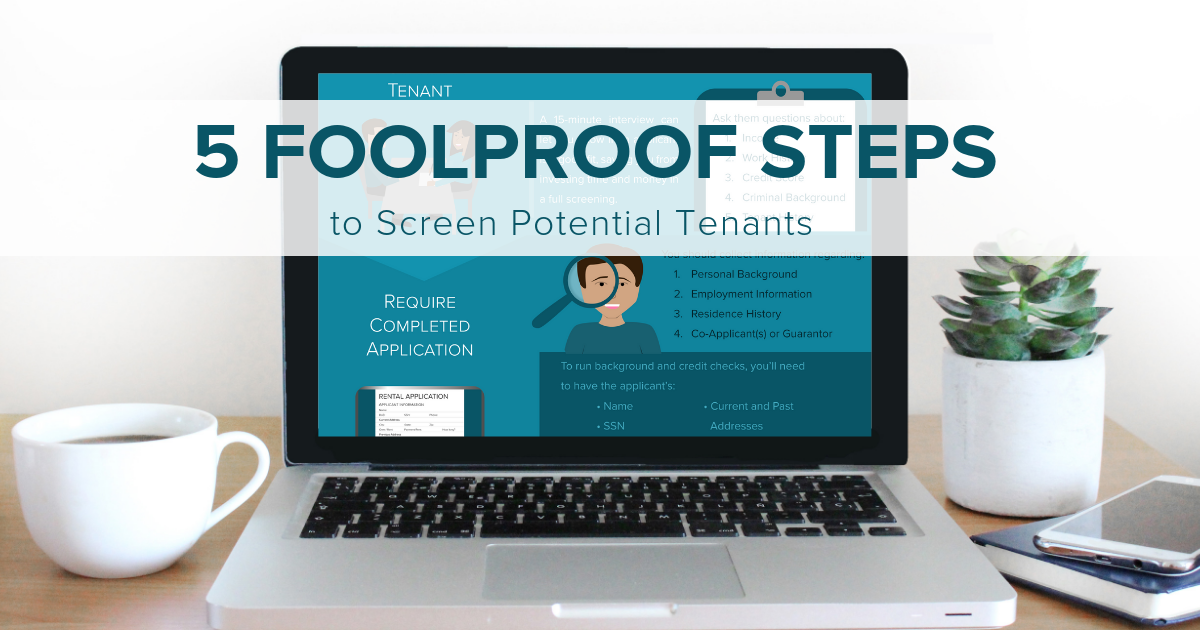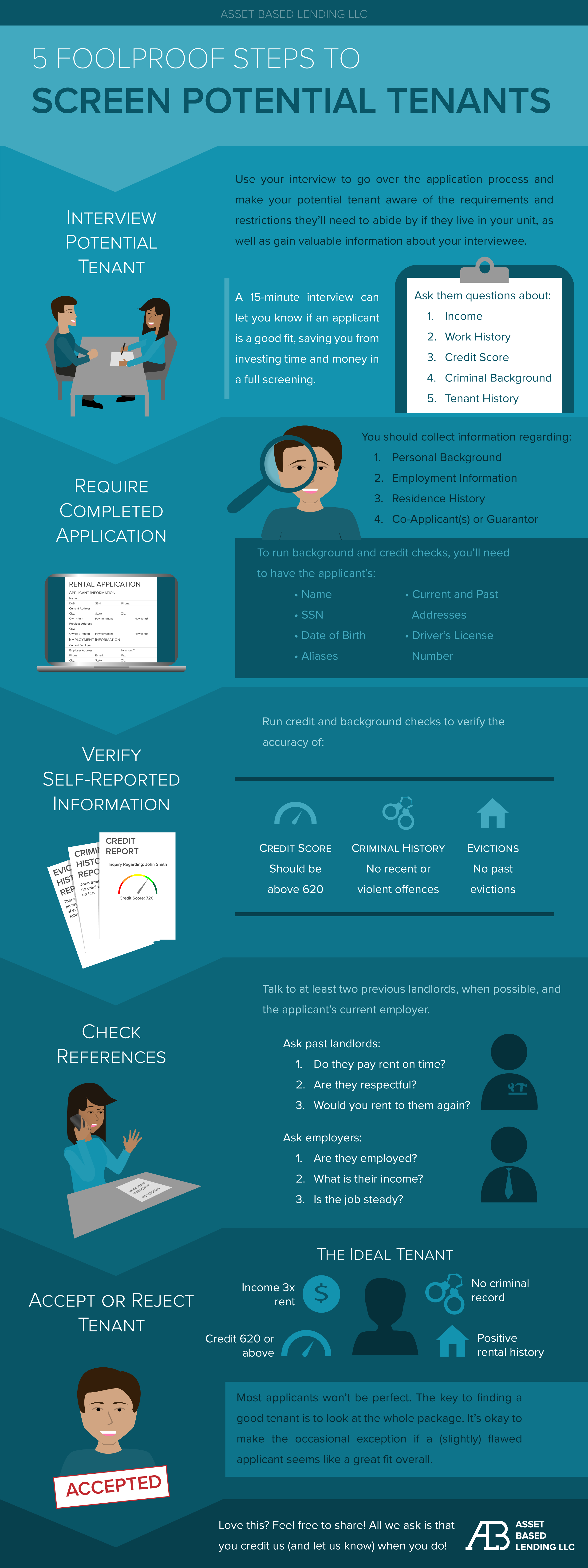Rental investments can be risky – especially if you don’t know how to properly screen your tenants. Evictions are messy and can take months or years; even if your tenant isn’t so bad you need to take drastic measures, less-than-ideal tenants can put a dent in your rental income by paying bills late, causing issues with neighbors, giving your property a bad rap, and failing to care for – or actively breaking things in – the unit.
Fortunately, it’s not all that hard to find renters who can properly handle themselves in a rental unit. Check out this infographic to learn our 5-step process to screen potential tenants.
Step 1: Interview Potential Tenant
Use your interview to go over the application process and make your potential tenant aware of the requirements and restrictions they’ll need to abide by if they live in your unit, as well as gain valuable information about your interviewee.
Even a 15-minute interview can give you enough information to decide if an applicant could be a good fit, saving you from investing significant time and money in a full screening. For best results, ask your potential tenant questions about:
- Income
- Work History
- Credit Score
- Criminal Background
- Tenant History
Of course, you’ll need to verify all this – but generally, people will more or less tell the truth in this first interview setting. If someone fails to fit into your pre-set tenant requirements, then you don’t need to continue with the screening process. Thank them for their interest, but let them know that they don’t fit the minimum tenant requirements for the property.
[su_box title=”PRO TIP” box_color=”#135666″ radius=”0″]Tell the interviewee that you are the property manager, not the property owner. If they get testy and try to argue with your decision not to move forward with the application process, tell them that the requirements are set by the owner, so there’s nothing you can do about it.[/su_box]
Step 2: Require Completed Application
If the potential tenant fits all your basic requirements, move on to the next step: the application. The main reasons for requiring an application are to officially start the tenant application process, collect the information you need to verify self-reported data, and check if the applicant is really considering the property (usually by requiring an application fee).
You’ll need to collect information regarding the applicant’s:
- Personal Background
- Employment History
- Co-Applicant(s) or Guarantor
To run background and credit checks, you’ll also need the applicant’s:
- Legal name
- Social Security Number
- Date of Birth
- Aliases
- Current and Past Addresses
- Driver’s License Number
[su_box title=”PRO TIP” box_color=”#135666″ radius=”0″]Check your state laws to figure out if you can legally charge a rental application fee, and if there are any limitations to the fee you charge. The average US rental fee is $30, but can be as high as $200 in highly desirable locations.[/su_box]
Step 3: Verify Reported Information
Once you have a completed application, you can use the information you’ve gathered to run credit and background checks. Together, these reports will help you verify the applicant’s credit score, criminal history (or lack thereof), and past evictions (ideally none).
Here’s what you should be looking for in your potential tenant:
- Credit score: Above 620
- Criminal history: No recent or violent offenses
- Evictions: No past evictions
After you’ve verified that your applicant meets these minimum requirements, you can move on to the next step in the process.
[su_box title=”PRO TIP” box_color=”#135666″ radius=”0″]You can use an all-in-one service like MyRental to get all the information you need from one source (MyRental provides eviction history, multi-state criminal and sex offender checks, a credit report, and more for just $30).[/su_box]
Step 4: Check References
This is why you need to collect contact information for the applicant’s current employer and landlords (present and past). The best predictor of how a tenant will treat your rental unit is how they treated their past rentals and landlords.
You should contact at least two previous landlords, when possible, and ask them:
- Does the tenant pay rent on time?
- Are they respectful?
- Would you rent to them again?
You’ll want to contact the applicant’s employer, as well, and ask:
- Are they employed?
- What is their income?
- Is the job steady?
Gathering this information will give you insight into the tenant’s willingness and ability to pay rent and utilities. Once you complete step four, you will have enough information to reasonably evaluate the applicant’s potential as a tenant.
[su_box title=”PRO TIP” box_color=”#135666″ radius=”0″]If you think your applicant may have provided fake references, you can do some online sleuthing to determine if the numbers are valid for a property management firm or business. If your tenant provided a private landlord reference, though, you can call the number and act like you’re looking for an apartment, then see how the reference responds.[/su_box]
Step 5: Accept or Reject Tenant
Your ideal tenant will have:
- Credit score of 620 or above
- Positive rental history, no evictions
- No criminal record
- Income at least 3x the rent
Keep in mind that most applicants won’t be perfect. The key to finding a good tenant is to look at the whole package – for example, maybe a potential tenant will have a stellar history with landlords but also have one or two public intoxication charges from their early 20s. It’s okay to make the occasional exception if a (slightly) flawed applicant seems like a great fit overall.
If you’re looking for a hard money loan to purchase and renovate a rental property, take a look at ABL’s cutting-edge Renovate to Rent loan program. Visit our website to prequalify for your loan or call us at 201-942-9089 to talk to a loan officer today.
*Always check the legal requirements regarding fair housing and the screening of potential tenants for you properties. ABL is not providing legal advice.

